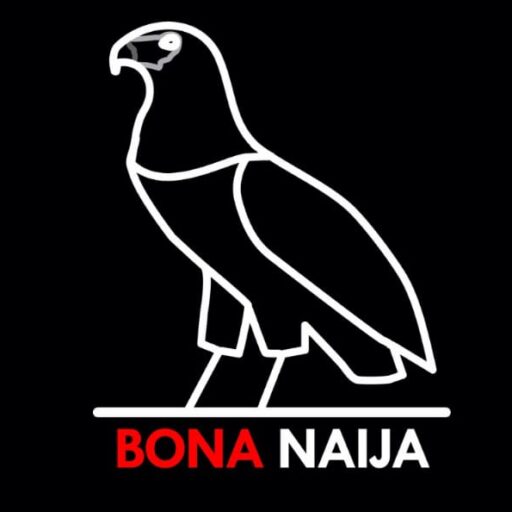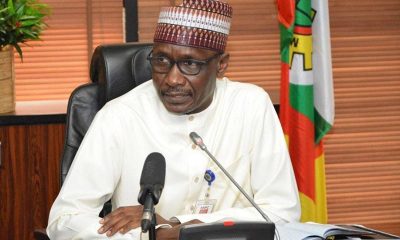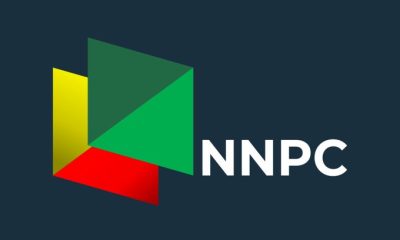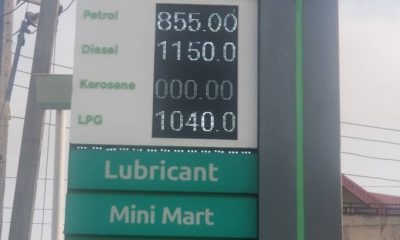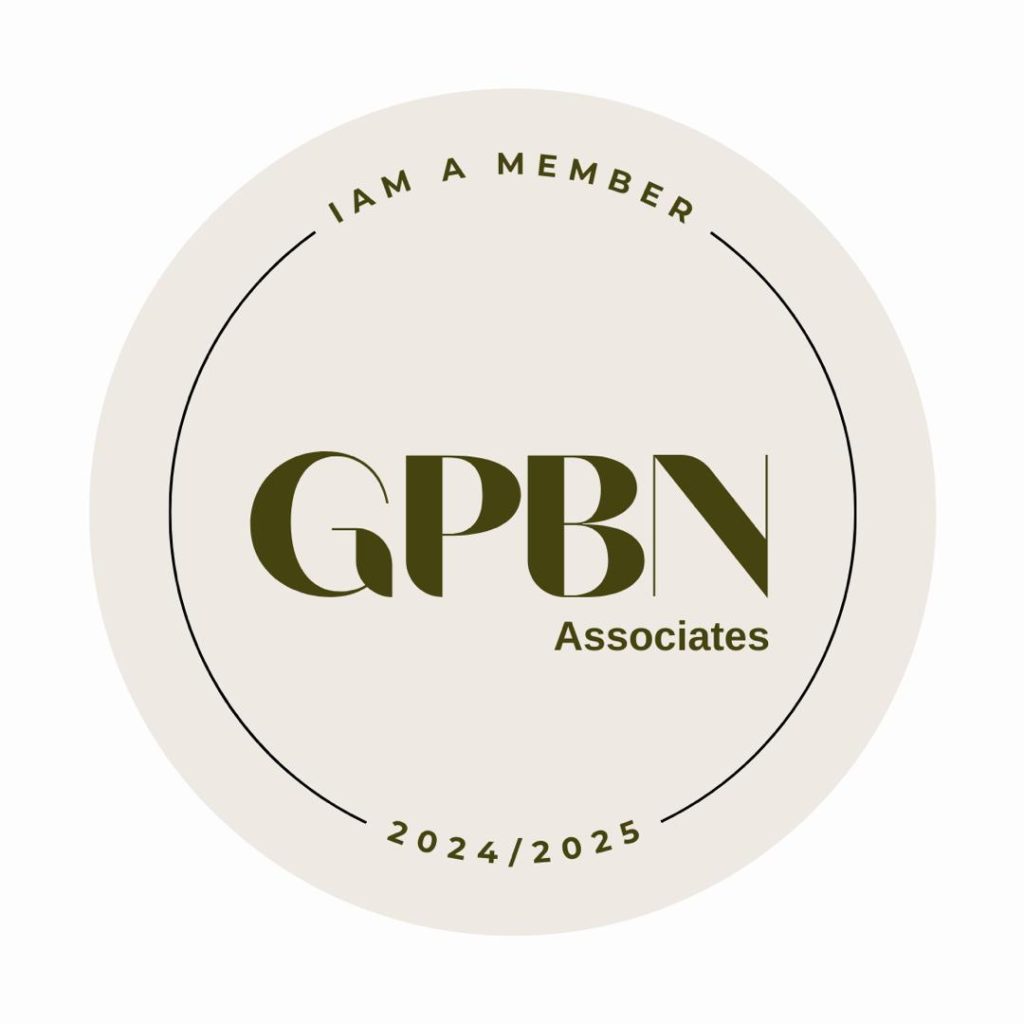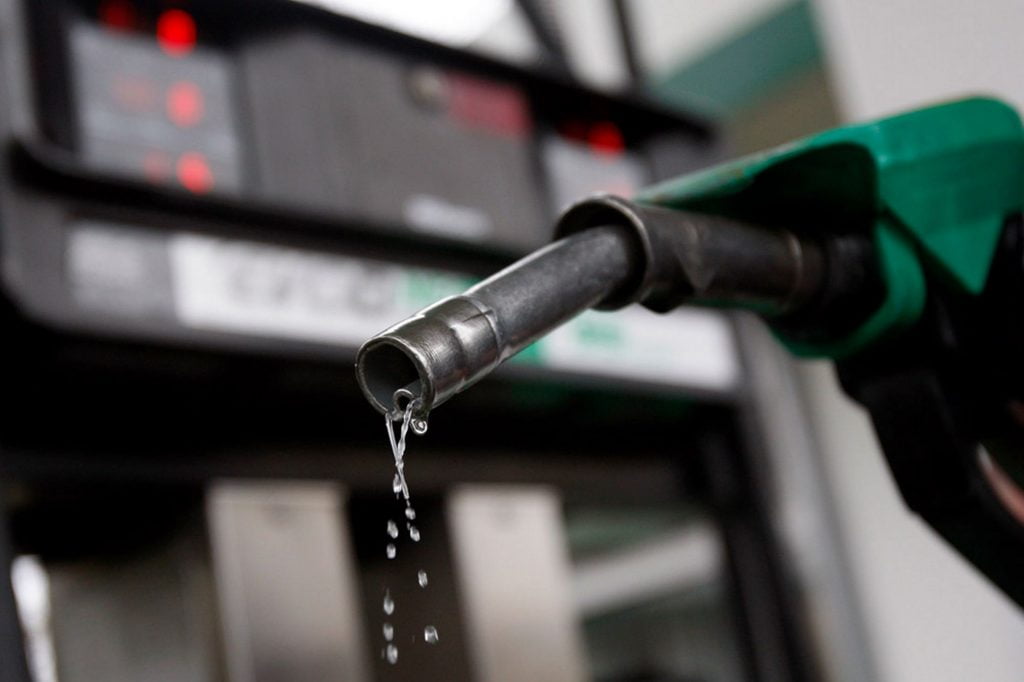

Business
Petrol Price May Drop Below N900/Litre Nationwide as Dangote Refinery Reduces Depot Price

Petroleum marketers and retailers have indicated that the recent reduction in the ex-depot price of petrol by Dangote Refinery will likely result in lower pump prices across Nigeria.
On Monday, the Dangote Refinery, which processes 650,000 barrels of crude oil per day and is located in Lekki, Lagos, announced a N10 refund on petrol sold at N835 per litre. This update was confirmed by the National Secretary of the Independent Petroleum Products Marketers Association of Nigeria (IPMAN) and the President of the Petroleum Products Retail Outlets Owners Association of Nigeria (PETROAN), Billy Gillis-Harry.
This adjustment means that affiliated stations such as MRS, Ardova (AP), Heyden, Optima Energy, Hyde, and Techno Oil are expected to revise their petrol pump prices downward.
As of Monday evening, MRS and other partner stations were selling petrol at N910 per litre. However, a staff member at an MRS outlet along the Kubwa Expressway in Abuja disclosed that the station plans to reduce its price to N900 per litre by midweek.
Additionally, a reliable source from the Nigerian National Petroleum Company Limited (NNPCL) revealed that the state-run oil firm might also lower its petrol price to between N880 and N900 per litre soon.
Attempts to get a statement from Dangote Group’s spokesperson, Anthony Chiejiena, were unsuccessful at the time of reporting.
Since April 9, when the Federal Government renewed its crude-for-naira deal with the $20 billion Dangote Refinery, the company has cut its petrol prices three times. The price dropped from N880 to N865, then to N835, and most recently to N825 per litre.
IPMAN’s National Secretary, James Tor, explained that these price cuts are expected due to the deregulation of the downstream sector. He said that market forces now determine petrol prices, and reductions from suppliers like MRS, NIPCO, and NNPC affect the whole market.
He also noted that the new collaboration between the NNPCL management under Bayo Ojulari and Dangote Group is a step toward stabilizing Nigeria’s fuel market.
PETROAN President Gillis-Harry also acknowledged that the industry is reacting to the Dangote price cuts, though he warned that constant fluctuations may harm market stability. He stressed the importance of predictable pricing for the health of the industry and said that although Dangote’s strategy may be to gain market share, long-term capital and consistency are key.
He added that PETROAN supports the Dangote–NNPCL collaboration if it helps improve energy access in Nigeria.
Meanwhile, global oil prices have declined, with Brent crude at $64.72 and WTI at $61.72 early Tuesday morning, according to oilprice.com.
This news follows a recent meeting between Dangote and the new NNPCL leadership.
Business
How FG’s 50 New Tax Exemptions Will Impact Salaries, Rent, and Small Businesses
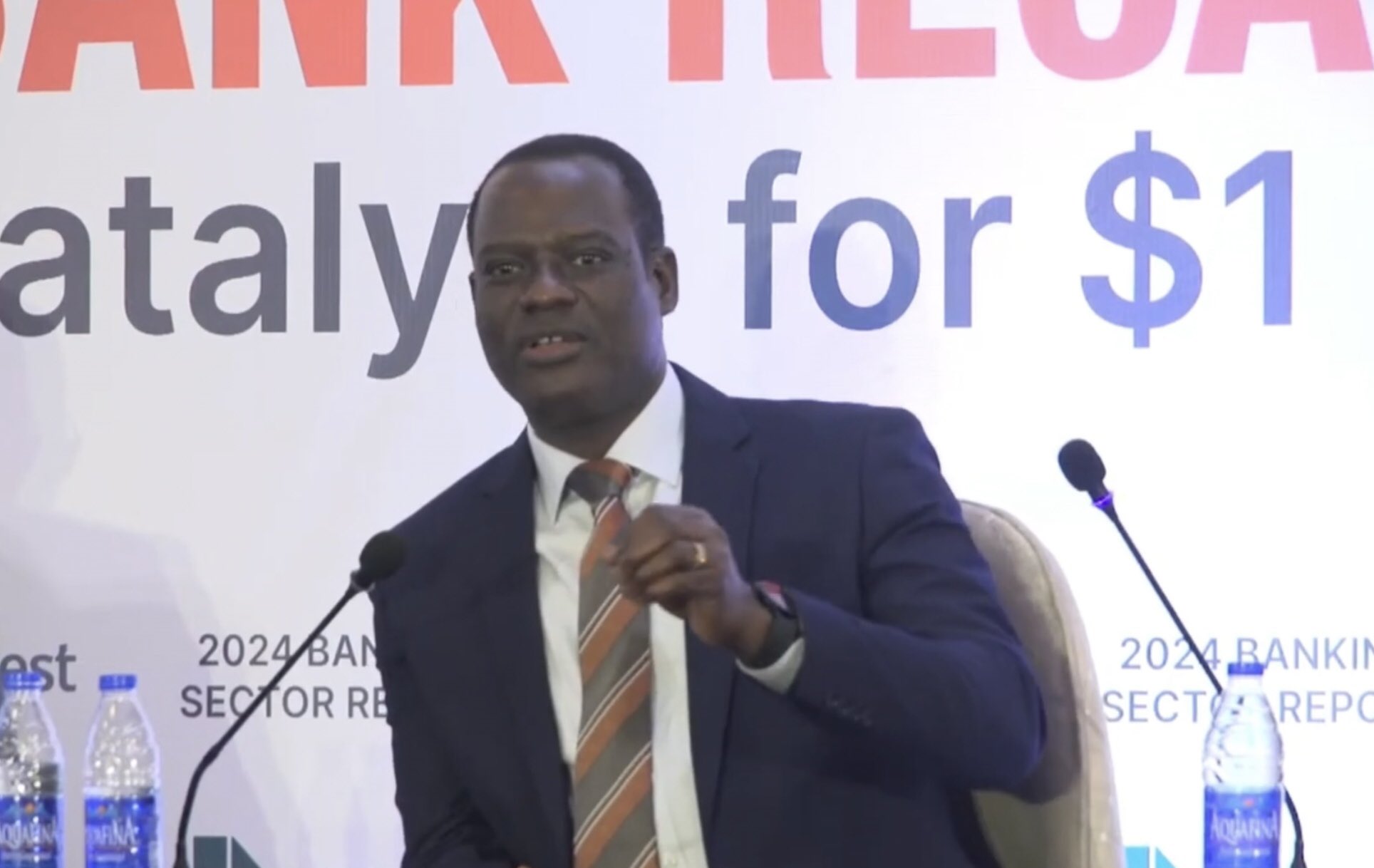
As part of its ongoing fiscal policy reforms designed to ease the burden on low-income earners and boost business competitiveness, the Federal Government has announced 50 new tax exemptions and reliefs set to take effect from January 1, 2026.
The wide-ranging measures, contained in the Tax Reform Laws, were unveiled by the Chairman of the Presidential Fiscal Policy and Tax Reforms Committee, Taiwo Oyedele, and form a key component of the administration’s agenda to promote inclusive growth, reduce inequality, and stimulate job creation across vital sectors.
According to details shared by Oyedele on X (formerly Twitter), the new laws will restructure Nigeria’s tax regime to favour low- and middle-income earners, micro, small and medium enterprises (MSMEs), startups, and strategic sectors such as agriculture, manufacturing, and technology.
Key Highlights of the New Tax Exemptions and Reliefs
1. Personal Income Tax (PAYE) Exemptions
- Individuals earning the national minimum wage or less will be fully exempt from paying Personal Income Tax.
- Annual gross incomes of up to ₦1.2 million (about ₦800,000 taxable income) will attract no tax.
- A progressive PAYE structure will reduce tax obligations for those earning up to ₦20 million yearly.
- Certain allowances and gifts will be tax-exempt.
2. Allowable Deductions
- Contributions to the National Pension Scheme, National Health Insurance, National Housing Fund, and life insurance/annuity premiums will remain deductible.
- Rent relief of up to 20% of yearly rent, capped at ₦500,000, will apply.
3. Retirement and Compensation Benefits
- Pension funds, gratuities, and retirement benefits under the Pension Reform Act (PRA) will remain tax-exempt.
- Compensation for job loss up to ₦50 million will not be taxed, offering relief for displaced workers.
4. Capital Gains Tax (CGT) Reliefs
- Gains from the sale of an owner-occupied home, personal effects worth up to ₦5 million, or two private vehicles per year will be exempt from CGT.
- Investors will enjoy exemptions on share transactions below ₦150 million annually or up to ₦10 million.
- Reinvested share proceeds, pension funds, charities, and non-commercial religious institutions will remain tax-free.
Corporate Tax Incentives
- Small companies with annual turnover not exceeding ₦100 million and fixed assets below ₦250 million will pay zero per cent Companies Income Tax (CIT).
- Eligible startups will enjoy full CIT exemptions.
- Companies that increase staff salaries, grant wage awards, or offer transport subsidies to low-income employees will qualify for a 50% additional tax deduction under compensation reliefs.
- Businesses that hire and retain employees for at least three years will receive a 50% employment deduction.
Agriculture & Startups:
- Agricultural enterprises in crop production, livestock, and dairy will enjoy a five-year tax holiday.
- Investors in certified startups will receive tax reliefs on qualifying venture capital, private equity, or accelerator funding.
Value Added Tax (VAT) Adjustments
- Basic food items, rent, educational materials, healthcare services, pharmaceuticals, and agricultural inputs will attract 0% VAT or be fully exempt.
- Diesel, petrol, and solar equipment will have VAT suspended.
- Small companies earning below ₦100 million annually will be exempt from charging VAT.
- Other VAT-free items include disability aids, baby and sanitary products, shared passenger transport, electric vehicles and parts, and humanitarian supplies.
Withholding Tax and Stamp Duties
- Small companies, manufacturers, and agricultural firms are exempted from withholding tax deductions on their income and supplier payments.
- Under Stamp Duties, electronic transfers below ₦10,000, salary payments, intra-bank transfers, and transfers of government securities or shares will now be exempt from charges.
Experts’ Reactions
Tax experts have described the reforms as one of Nigeria’s most ambitious fiscal overhauls in recent years, aimed at simplifying the nation’s complex tax system while making it fairer and more inclusive.
They noted that the initiative aligns with government efforts to reduce the tax burden on productive sectors, enhance voluntary compliance, and boost revenue efficiency without stifling economic activity.
By targeting low- and middle-income earners, MSMEs, and strategic industries, the new policy aims to spur consumption, investment, and employment generation key drivers needed to revitalize the economy amid global uncertainties.
Follow BONA NAIJA for more
Business
Aliko Dangote Urges Nigerians to Sell Dollars as Naira Strengthens on Refinery Boost
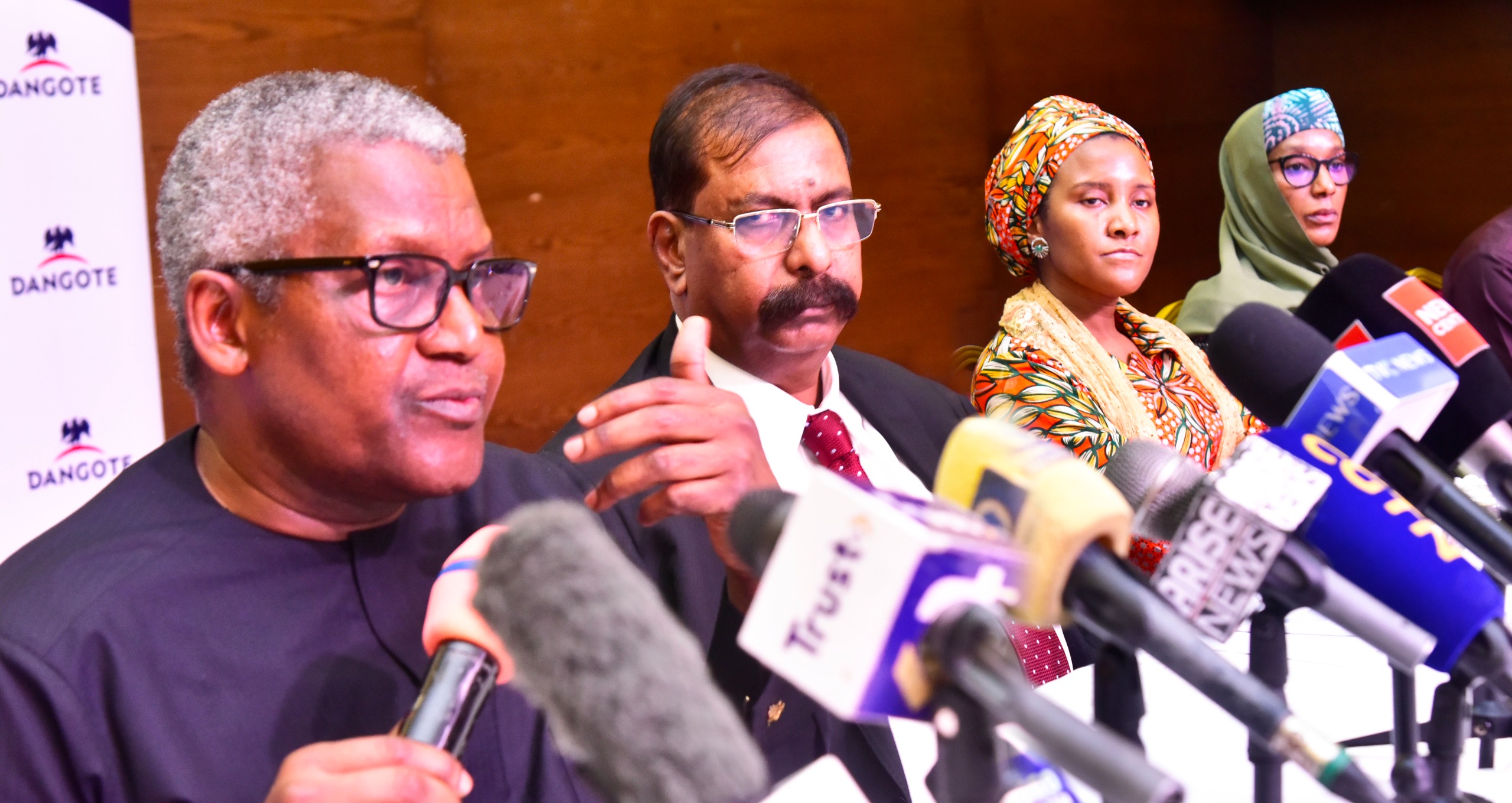
Africa’s richest man, Aliko Dangote, has advised Nigerians to sell their U.S. dollars, predicting that the naira will appreciate significantly within the next one to two months.
Dangote attributed his optimism to the operations of his 650,000-barrel-per-day refinery, which he said is cutting fuel import costs and strengthening Nigeria’s foreign reserves. The country’s reserves have reportedly climbed to $35 billion as of late October 2025, with the naira stabilizing around ₦1,459 to the dollar.
He also highlighted the federal government’s commitment to supporting refinery expansion to 1.4 million barrels per day under President Bola Tinubu’s administration a move aimed at boosting energy security, reducing forex pressure, and enhancing long-term economic stability.
Follow BONA NAIJA for more
Business
Unity Bank Corpreneurship Challenge Empowers 578 Young Entrepreneurs, Awards ₦16 Million to 30 New Winners
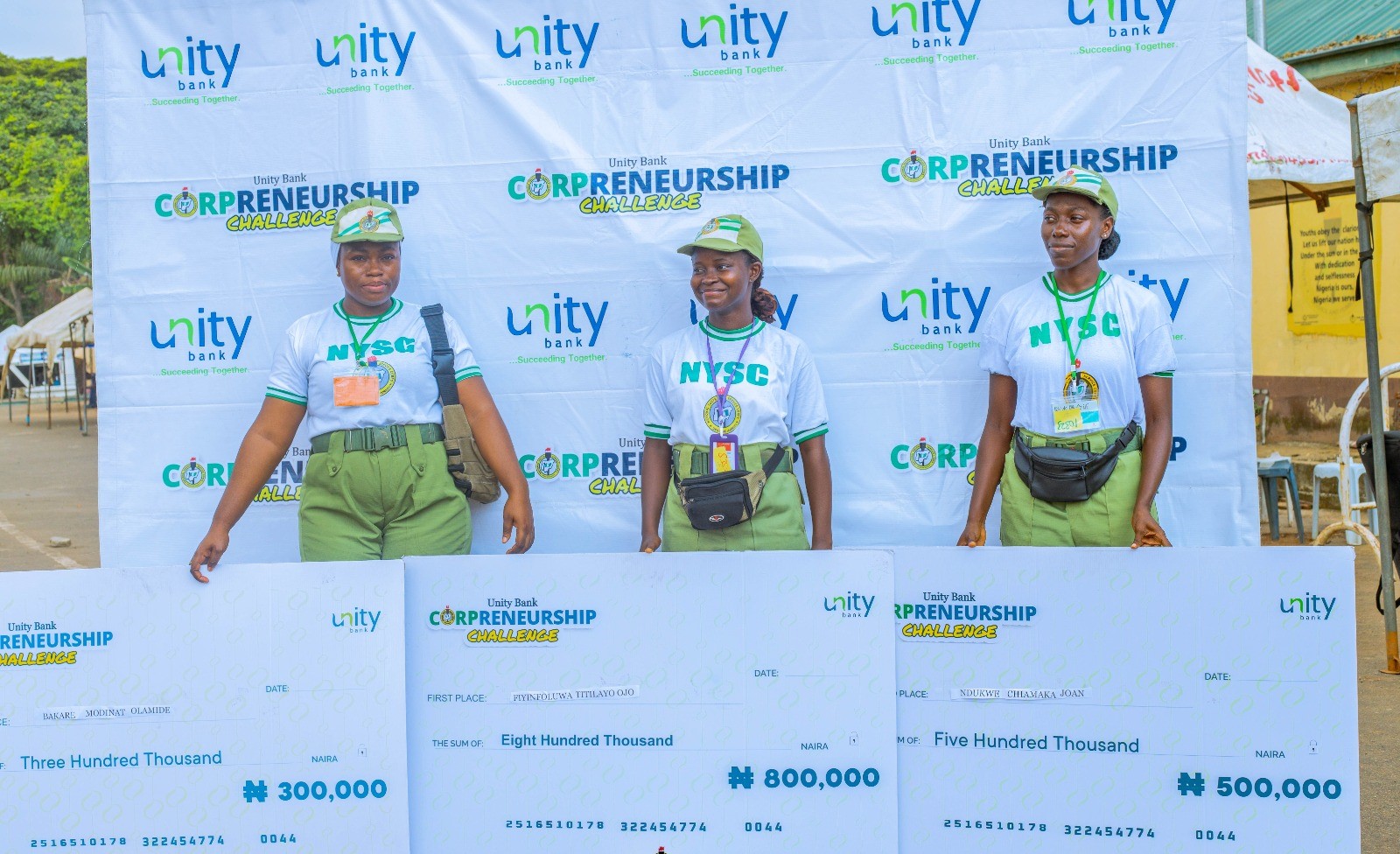
No fewer than 578 young entrepreneurs across Nigeria have benefitted from Unity Bank’s Corpreneurship Challenge the Bank’s flagship entrepreneurial development initiative launched a few years ago.
Over this period, the Bank has invested in supporting budding entrepreneurs across multiple sectors to start businesses, create jobs, and contribute to Nigeria’s economic growth.
The ongoing initiative recently produced 30 new winners, who received a total grant of ₦16 million during the Batch B, Stream II edition of the National Youth Service Corps (NYSC) orientation course, held across 10 states of the federation.
The winners, innovative young entrepreneurs developing solutions across various value chains such as fashion design, bag making, pastry and beverage production, event management, and vegetable farming, emerged after pitching their business ideas during the challenge at NYSC Orientation Camps in Lagos, Delta, Kaduna, Jigawa, Kwara, Benue, Abia, Kogi, Rivers, and Plateau States.
At the NYSC Orientation Camp in Ipaja, Lagos State, Fiyinfoluwa Titilayo Ojo, who pitched a soap-making enterprise, emerged the overall winner to clinch the ₦800,000 grand prize. Ndukwe Chiamaka Joan, with her innovative Small Chops business proposal, claimed ₦500,000 as first runner-up, while Barakat Modinat Olamide secured ₦300,000 to support her beverage-making venture.
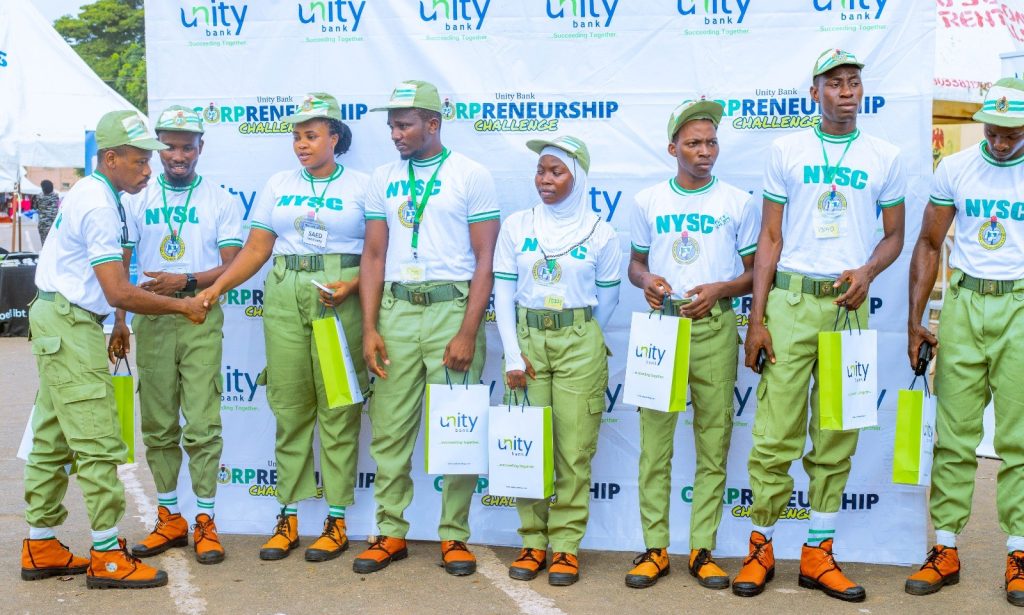
Expressing her excitement after emerging as the overall winner in Lagos, Fiyinfoluwa Titilayo Ojo described the experience as life-changing, stating, “I’m truly grateful to Unity Bank for this opportunity. Winning the Corpreneurship Challenge has given me the push and confidence I needed to scale my soap-making business. Beyond the grant, the experience taught me how to structure my business better and believe in its potential. It’s amazing to see a bank that genuinely invests in young people’s dreams.”
Across the remaining nine states, 27 other winners also emerged after pitching diverse business ideas ranging from fish and poultry farming to printing, piggery, and cake production.
Over the past six years, the Unity Bank Corpreneurship Challenge has become an integral part of the NYSC programme, aligning with the Federal Government’s drive to upskill young graduates and promote entrepreneurship amid the scarcity of white-collar jobs. Each edition attracts thousands of entries from corps members whose business plans are evaluated for originality, marketability, job creation potential, and overall business acumen.
Speaking during the grand finale in Lagos, Unity Bank’s Divisional Head, Retail & SME, Mrs. Adenike Abimbola, reaffirmed the Bank’s commitment to empowering Nigerian youth through enterprise. She said:
“At Unity Bank, we believe that the energy and creativity of young Nigerians are vital to the nation’s economic transformation. The Corpreneurship Challenge is our way of nurturing this potential — by giving corps members the financial boost, mentorship, and confidence to turn their ideas into thriving businesses. Seeing over 578 young entrepreneurs already impacted motivates us to keep expanding the initiative and deepening our support for the SME ecosystem.”
The Corpreneurship Challenge has earned Unity Bank national recognition for its role in youth empowerment and job creation, attracting over 2,000 applicants per edition.
In partnership with the NYSC Skill Acquisition and Entrepreneurship Development (SAED) programme, the initiative continues to serve as a launchpad for youth-owned enterprises, offering grants of up to ₦800,000 to help corps members turn their business dreams into reality.
Follow BONA NAIJA for more
Business
NIRSAL Facilitates ₦70 Billion in Agribusiness Financing, Boosts Agricultural Lending in 2025

The Nigeria Incentive-Based Risk Sharing System for Agricultural Lending (NIRSAL Plc) has announced a remarkable rebound in its operations, which has resulted in the facilitation of over ₦70 billion in commercial financing for agribusiness as at Q3 2025, its strongest annual performance since inception.
In operation since 2013, this result represents nearly a quarter of the organisation’s cumulative ₦270 billion facilitated for agriculture and agribusiness to date, an achievement that underscores the impact of NIRSAL’s revamped strategy under its new Board and Executive Management.
The timing of this turnaround is critical: Bank lending to agriculture had been in steady decline, falling from 6.18% of aggregate lending in 2022 to 4.82% in 2024, while sectoral growth slowed from 2.5% to 1.7% within the same period. By applying its signature tools for value chain modelling to address identified issues, providing technical support to agribusinesses and financial institutions, all while deploying its risk-sharing frameworks, NIRSAL has restored lender confidence thus channelling fresh funds into key value chains, including grains, cocoa, shea, and livestock.
In terms of impact, there has been an improvement in local production across key commodities and a positive balance of trade for agriculture, with over 32% of the facilitated sum directly supporting value-added commodity export. Most notably, agriculture’s share of bank lending has risen again to 5.33% as of May 2025, reflecting renewed interest from financiers. Two newly licensed banks have also entered the sector relying on NIRSAL’s frameworks, contributing to the ₦70 billion facilitated so far this year.
Commenting on the milestone, NIRSAL’s Managing Director/CEO, Sa’ad Hamidu, said: “₦70 billion may appear modest compared to the size of Nigeria’s agricultural financing needs, but the significance is profound. It proves that agriculture can be commercially and sustainably financed. With the right blend of capital, technical support, and risk mitigation, the sector can become more productive, resilient, and globally competitive.”
Hamidu added that NIRSAL remains confident of hitting its ₦150 billion target for 2025: “This is not yet the peak of the harvest season when merchants typically seek credit for offtake and storage, and when super agro-dealers stock up on fertilisers and inputs ahead of the next planting cycle. Therefore, the opportunities still to come give us every reason for optimism.”
Beyond headline figures, NIRSAL is working to reshape the lending landscape for agriculture. Its integrated model, spanning prospect identification, deal structuring, business advisory, and credit guarantees, handholds agribusinesses from loan origination to disbursement. Also, by providing tailored advisory and risk mitigation, the institution helps businesses once deemed unbankable to gain access to sustainable credit.
Through this approach NIRSAL aid the creation of a pipeline of emerging agribusinesses while supporting established firms to scale. Meanwhile, several borrowers who once engaged NIRSAL have since graduated into routine lending relationships with their bankers whose understanding of the dynamics of agribusiness has grown, leading to greater comfort in lending. This proves that the NIRSAL model is a pathway to long-term sustainability in the agriculture sector.
The ₦70 billion facilitated so far this year is a direct outcome of NIRSAL’s sustained capacity-building efforts for financial institutions. Through targeted training sessions for over 1,100 staff of banks, NIRSAL has deepened understanding of agricultural financing within its risk-sharing framework leading to an increase in loan request approvals. Similar training programs for agricultural value chain actors, including 450 participants trained on feedlot management, commodity export, and climate finance so far, will become increasingly evident over time, as capacity and confidence grow across these sub-sectors.
As part of its forward agenda, NIRSAL is developing a digital network it calls the NIRSAL LandBank portal—a connected ecosystem of agricultural stakeholders, from research and development to markets, to provide data-driven insights for investors, policy makers, and development partners for the identification of opportunities, risk reduction, and informed decision-making.
The LandBank portal would become an additional channel for project development, with climate finance another potential source of funding. NIRSAL continues to deepen its interest in and collaboration around climate finance, recently signing an understanding with the Rural Electrification Agency to provide off-grid power to production and processing clusters in rural locations. These efforts, the institution believes, will build resilience into the agricultural value chain and aid Nigeria’s push toward a $1 trillion economy.
Since its establishment, NIRSAL has remained faithful to its mandate of de-risking agricultural lending, facilitating finance across the value chain, and proving that agriculture is both bankable and sustainable. Its 2025 performance to date signals not just recovery, but a new era of confidence for Nigeria’s farmers, financiers, and the wider economy.
Follow BONA NAIJA for more
Business
Lagride Expands App Options, Prepares to Launch Omni Mini Bus for Families and Groups in Lagos
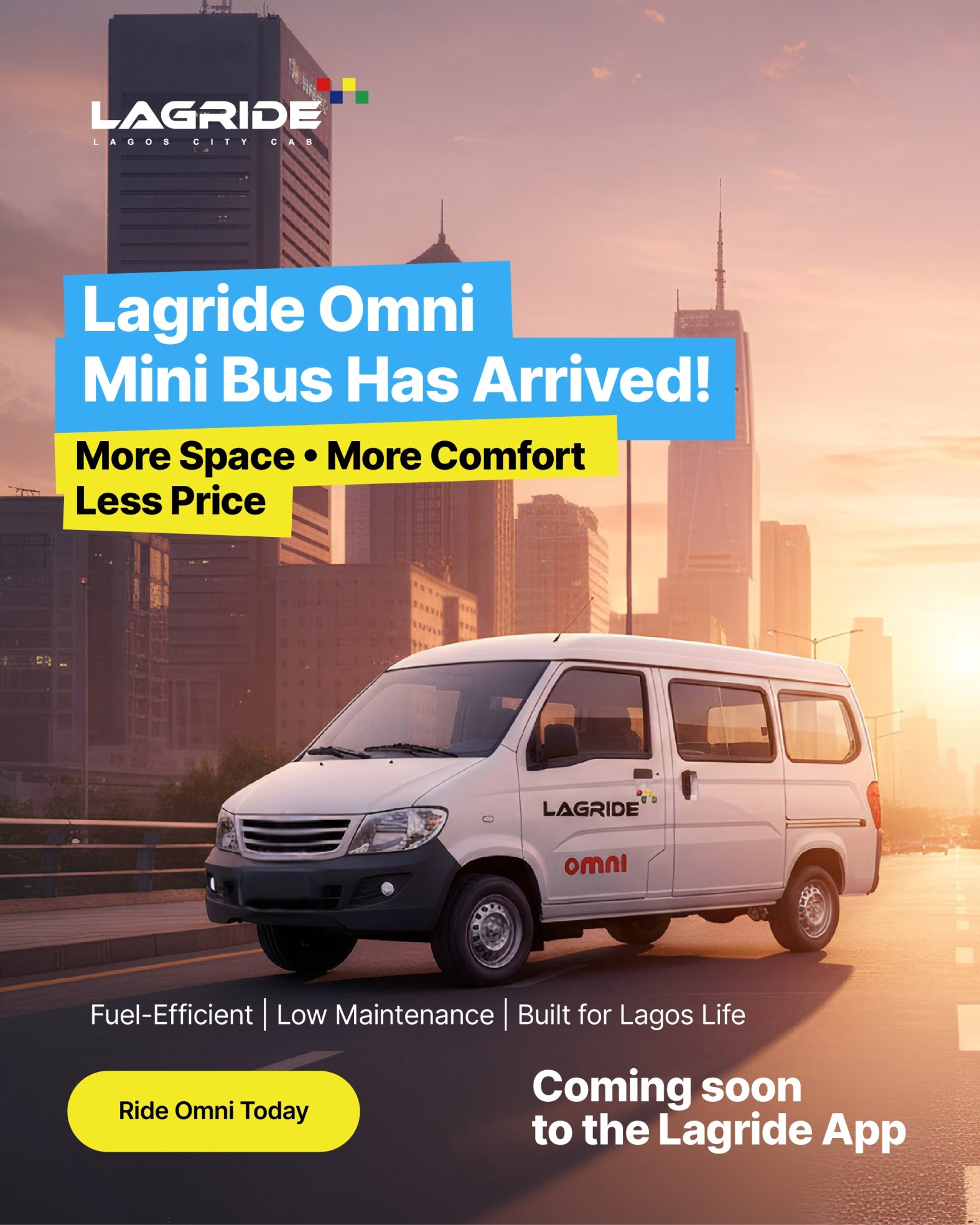
Lagride, the government backed e-taxi platform for Lagos, has expanded rider choice inside the app and confirmed preparations for the release of Lagride Omni, a mini bus category designed for families, groups and everyday commuters. The announcement reinforces Lagride’s vision of providing Nigeria’s most comprehensive mobility platform with options that serve every need, every budget and every Lagosian.
Expanded Choices Inside the App
Riders opening the Lagride app today will see three clear choices available:
Lagride EVs – Eco-friendly electric vehicles that deliver cleaner, quieter and cost-efficient trips. They represent Lagos’ future of sustainable transport.
Lagride Pro – Brand-new cars operated by professionally trained Captains who have undergone world-class service, safety and hospitality training at the Lagride Academy. Pro represents the premium benchmark for safety, comfort and excellence.
Lagride Legacy – Verified, owner-driven cars from 2022 and above that continue to provide affordable, reliable everyday rides for Lagosians who want trusted value.
This multi-category approach means riders can match the right car to the right moment: an EV for eco-conscious travel, Pro for a business meeting or special outing, and Legacy for everyday mobility.
Omni is Next: More Space, More Value
The Lagride Omni mini bus will become the fourth option on the platform. Spacious enough to seat six passengers plus luggage, Omni is specifically designed for families, school runs, office commutes, weekend trips and social outings.
Omni addresses some of the biggest challenges of urban mobility in Lagos:
Party Ride – One car that fits all friends, creating a better atmosphere at a lower per-person cost than multiple vehicles.
Last-Mile Commute – 3–4 colleagues sharing a ride directly from the bus stop to the office, saving time and money while reducing congestion.
Safe School Runs – Parents booking fixed, daily trips for children with the reassurance of real-time app tracking and certified Captains.
By combining space, safety, affordability and dignity, Omni promises to be a game-changer for groups of three or more.
Supporting Lagosians During the Rains
With heavy rains and flooding disrupting city movement, Lagride is stepping forward to support Lagosians with a 40% discount promotion.
The offer runs from 24 September to 13 October 2025.
Eligible riders can check if they qualify by clicking on the Coupons section in the Lagride app.
This promotion is part of Lagride’s wider commitment to easing the burden of mobility during challenging times.
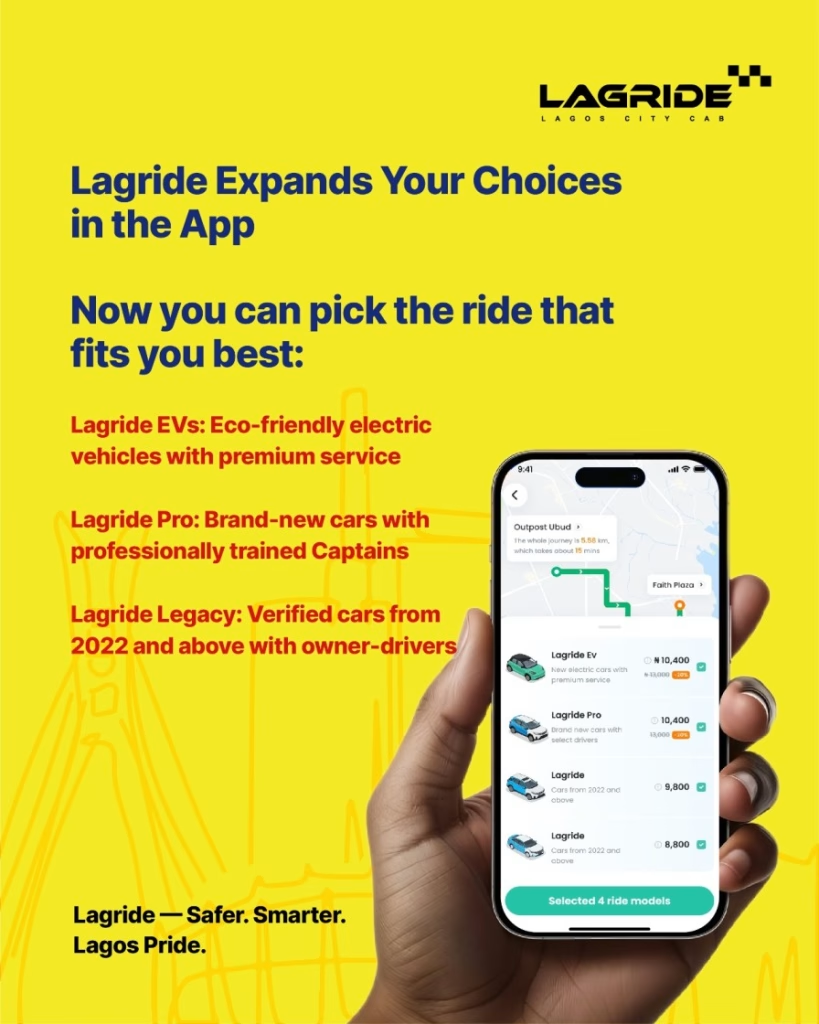
Voices from Lagride
Chief Diana Chen, Chairman, CIG Group and Lagride;
“Mobility is at the heart of Lagos life, and it is at the heart of society. When people move safely, affordably and with dignity, families flourish, businesses thrive, and communities feel stronger. Lagride is not just a transport platform, it is a social contract to move Lagos better.
By expanding choices in the app today, we are giving Lagosians more power to decide how they travel. With Omni launching soon, we are addressing group needs in ways no platform has done before. And by offering a 40% discount during the rains, we are showing empathy and responsibility at a time when the city needs it most.”
Jubril Arogundade, Acting MD, Lagride;
“Choice matters. Lagos is a city of different needs and different rhythms. That is why Lagride now offers EVs for cleaner trips, Pro for premium experiences, and Legacy for everyday mobility. Omni will soon join as the perfect option for families, colleagues and groups of friends.
Every step we take is designed to support the governor’s mobility agenda, to empower drivers with world-class training, and to make riders proud of the service they choose. This is how we are building Nigeria’s most comprehensive e-taxi platform.”
Training, Standards and Opportunities
Lagride is equally focused on empowering its Captains. All Pro and EV drivers undergo rigorous training at the Lagride Academy, delivered in partnership with the Nigerian Police, FRSC, LASTMA and other regulatory bodies. The Academy also includes hospitality training modules, ensuring drivers deliver service that meets international standards and transferable skills they can use anywhere in the world.
In addition, Lagride is actively recruiting 10,000 new drivers and partners under its Drive-to-Own and Drive-to-Earn schemes, giving Lagosians the opportunity to build sustainable livelihoods through the platform.
About Lagride
Lagride is Lagos State’s government backed e-taxi platform, designed to deliver safe, affordable and world-class mobility to the city’s residents. By combining trained drivers, a modern app, and rigorous safety standards, Lagride provides services that Lagosians can trust.
With EVs, Pro, Legacy and soon Omni, Lagride is building Nigeria’s most complete transport ecosystem.
Download the app: https://onelink.to/qryswh
Become a driver: https://forms.gle/LuTN51cNeKkpaMn88
-

 World News4 weeks ago
World News4 weeks agoUS Military Submits Contingency Plan for Action in Nigeria
-

 Music2 weeks ago
Music2 weeks agoNikos Living Releases ‘Call My Name’ Featuring Peruzzi and Young Jonn
-

 Music News3 weeks ago
Music News3 weeks agoBurna Boy, Davido, Ayra Starr, Wizkid Lead Nigeria’s Charge in 2026 Grammy Nominations
-

 Entertainment3 weeks ago
Entertainment3 weeks agoDavido Splashes ₦1.08 Billion on 2025 Rolls-Royce Black Badge Cullinan
-

 Africa3 weeks ago
Africa3 weeks agoJCI Nigeria’s Oluwatoyin Atanda Named 2025 Most Outstanding National President
-

 News2 weeks ago
News2 weeks agoBrig-Gen M. Uba Killed by ISWAP After Terrorists Intercepted His Location
-
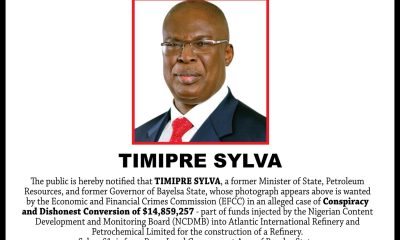
 News3 weeks ago
News3 weeks agoBREAKING: EFCC Declares Ex-Governor Timipre Sylva Wanted Over $14.8m Fraud
-

 Biafra1 week ago
Biafra1 week agoJudge Orders Nnamdi Kanu Out of Courtroom as Judgment Begins
-
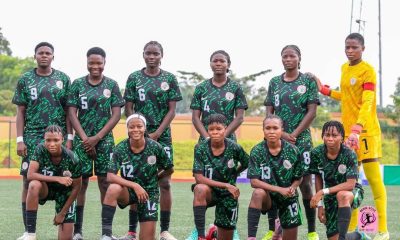
 Sports3 weeks ago
Sports3 weeks agoFalconets Beat Ghana 3–0 to Win 2025 WAFU B U-20 Championship in Benin Republic
-

 Abuja3 weeks ago
Abuja3 weeks agoTension in Abuja as Soldiers Block Wike from Accessing Gaduwa Land Linked to Retired Admiral


